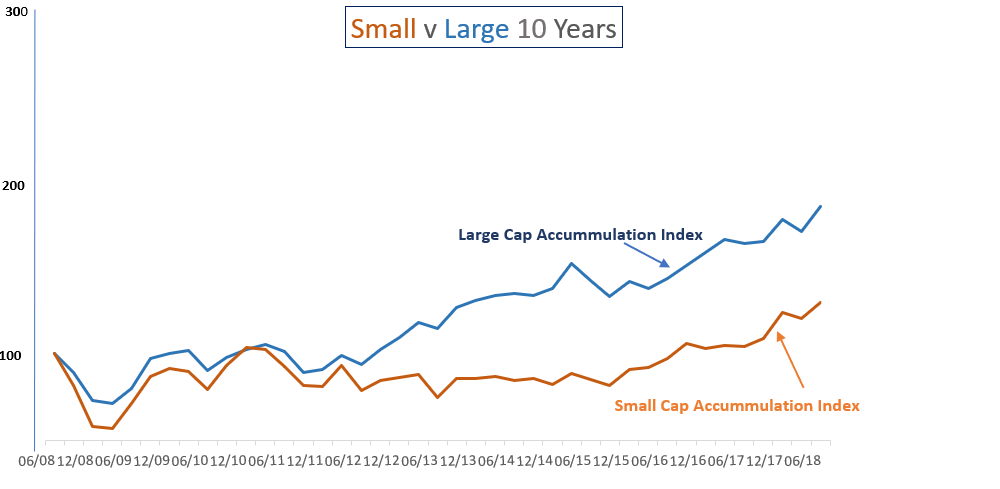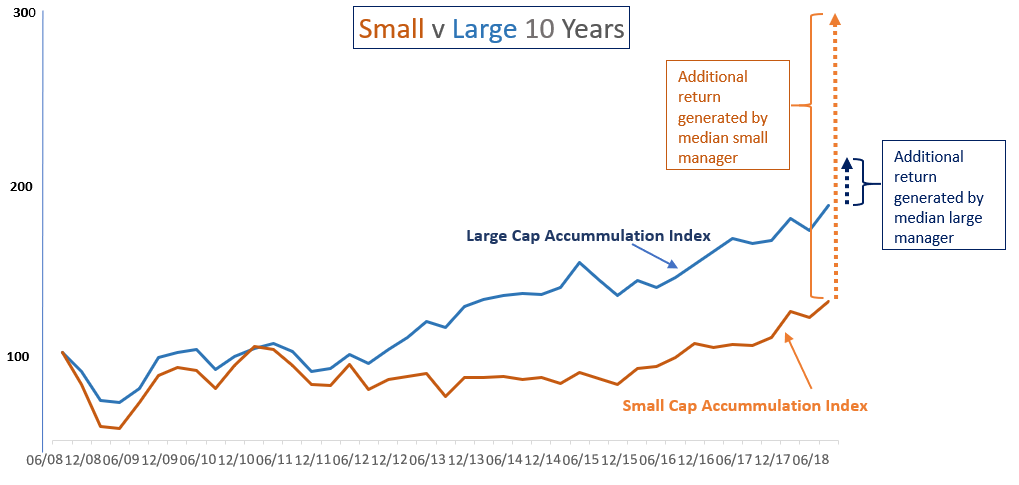The lost decade for Small Caps?

8IP
Real estate agents rarely say that property is not a great investment and small cap managers tend to highlight the benefits of investing today in smaller companies that will grow to be the successful behemoth companies over the next decade. In addition, we have the academic claims of higher long term returns from small caps or the so-called “small cap premium” although this has been refuted by other academic papers since the 1980s. But do the numbers support the small cap promoters’ claims?
The answer as in many arguments is, “it depends”. Naturally the first step is to grab the long term “data” although this can be problematic given our Small Ordinaries index was launched in 2000. In any case showing the results to many clients has led to the reaction “Brian -surely you have the labels around the wrong way!”. Unfortunately for small cap aficionados, the index results have been underwhelming for the last decade as shown in the chart below:-
Chart 1: Small cap index (Small Ordinaries Accumulation) results compared to the larger cap (ASX300 Accumulation), both include dividends re-invested:

So what happened? – essentially :-
- Extremely accommodative monetary policy has driven a large cap rally around the world
- Small caps did suffer more from the ravages of the GFC as you can see from the chart
- The deflation in commodity prices from around 2011-2015 had more of an effect on small caps.
Not the end of the story
Given that many people find it hard to research and choose their own portfolio of smaller companies (made difficult in many cases by lack of broker/research coverage), they tend to use professional fund managers to do the job. Using the Mercer* survey as a guide, it is helpful to add back any additional return the median manager has produced over that period. In Chart 2. below I have adjusted the end point for both Small (orange dotted line) and Large Caps (blue dotted line) to show what the median manager had achieved in addition to their index based on the Mercer Survey. The results are quite staggering.
Chart 2: Small cap index (Small Ordinaries Accumulation) results compared to the larger cap (ASX300 Accumulation), and the Mercer* Median Manager

In some respects the academic research also supports this notion with some advisers saying that there is a clear small cap premium if you consistently apply a quality filter. This makes intuitive sense in that there are many companies out there vying for investors’ capital outside the top 100, so throwing out the low quality stocks in this universe should improve returns. (e.g. see this report from advisor ratings).
What about the longer term?
These are the sort of numbers that have been used in the US (where we have a longer small cap series to analyse). I suspect the nature of the Australian market is different and, of course, not many people have an 88 year investment time horizon!

The bottom line
Small and micro-cap markets are a great place to generate alpha and complement many Australian’s top-heavy portfolios. In this market, obtaining the median small cap manager’s performance should produce a good return above the larger cap market for investors with a 5 year plus time horizon.

Brian has been in the financial services industry for over forty years specialising in superannuation and investment management covering administration, asset consulting, product development, marketing, distribution, and asset allocation.
Expertise

Brian has been in the financial services industry for over forty years specialising in superannuation and investment management covering administration, asset consulting, product development, marketing, distribution, and asset allocation.
